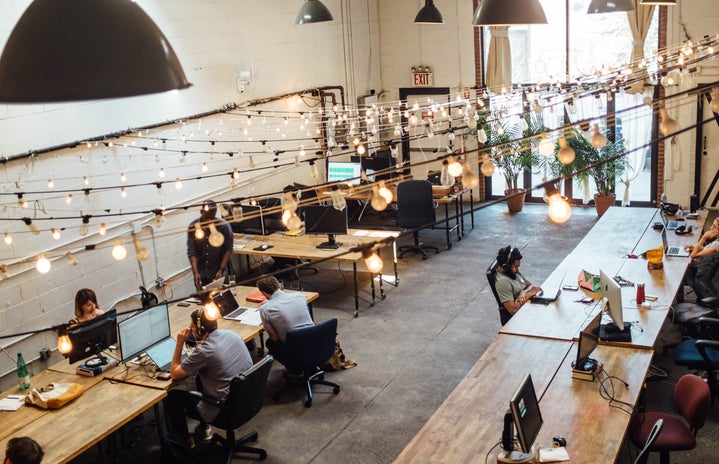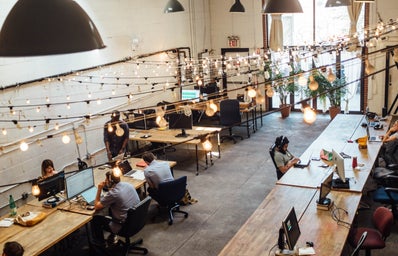Whether you’re graduating soon or planning on interning this summer, chances are you have some type of job interview in the near future. And it’s no little secret that job interviews can be stressful, complicated, hair-pulling experiences.
But they don’t have to be. This isn’t to say that you’ll begin loving going on interviews, but by being prepared and knowing what you’re getting yourself into you can rest assured knowing that you’re going to give it your best shot.
In case you aren’t exactly an interview guru yet, read on and you’ll learn some value tips to take you from nervous newbie to confident collegiette!
Make sure you do your research
You land an interview, now what? Research, research and research! It’s incredibly important that you make the time to research three things prior to the interview: the industry/career field, the organization and the interviewer.
Overall, knowing the organization is probably the most important, as you can bet you’ll be faced with a “Why do you want to work here?” question. You should be prepared to answer questions about the organization’s products, services or clients—as well as more general knowledge such as when the company was founded, who the president/CEO is, etc. Boston College has a great checklist of sites you should visit when researching an organization.
“I always start my research by visiting the organization’s website and social media,” says Courtney, a senior at the University of Southern California. “I also Google them to see if they have recently been in the news. Looking into these channels allows you to see the sort of public image the organization has versus what they project, and it will give you an idea of the kinds of questions to ask when you go in.”
Next, you should do some general research about the industry or career field. For example, you shouldn’t walk into an interview with an advertising agency without knowing as much as you can about the advertising industry as a whole! To do this, you should Google trade publications, find industry leaders on Twitter or LinkedIn and refer to business publications (such as the Wall Street Journal or AdAge) for the latest news.
When researching your interviewer (if you know who he or she is prior to the interview—which you should), your best bet is to look at LinkedIn or Google the person’s name. The most important things to discover about the interviewer include:
- Their current position at the company and how long they have been there
- Any companies they might have worked at before
- Where they attended college and when
- Their social media profiles (Twitter, LinkedIn, personal blogs, etc.)
Knowing these simple facts can help you build a relationship with your interviewer. Maybe you went to the same school, were in the same sorority or grew up in the same city. This helps to make you appear more prepared and memorable and to make a connection.
How to dress
Besides being uninformed, one of the worst things you can do in an interview is be dressed inappropriately. In most instances—unless you specifically know for certain that a company would want you to dress in a different way—be as conservative as possible! The “Thursday night out dress” should notmake an appearance in the Tuesday morning interview!
So how should you dress? Alison Doyle from About.com suggests the following guidelines for interview attire:
- Solid color, conservative suit
- Coordinated blouse
- Moderate shoes
- Limited jewelry
- Neat, professional hairstyle
- Tan or light hosiery
- Sparse make-up & perfume
- Manicured nails
Seem a little stiff? It might be. And it certainly does not apply to every industry. If you’re interviewing for a clothing company or magazine, it might be better to take some risks (such as noticeable heels or a bright, stylish blazer). But—even in the corporate world—there are certainly some ways you can make the look younger.
Preparing for an interview might require some shopping if you don’t already have an appropriate outfit, but it will be worth it when you land the job!
[pagebreak]
What to bring
Though you certainly aren’t expected to (and probably shouldn’t) walk into an interview with a large bag of things, there are a couple that you definitely shouldn’t forget!
First, extra copies of your resume are essential. In today’s world, chances are your resume is lost among email in your interviewer’s inbox. They might even ask you to “give them a minute to find it.” Don’t make them find it! Tell them that you have extra copies and ask how many they would like. This shows that you’re both prepared and skilled at anticipating needs.
Next, don’t forget a pen and notepad. You may not actually use these items during the interview, but it’s better to be safe than sorry! More than anything, this makes you appear prepared. If—for any reason—the interviewer asks you to jot something down and you don’t have a pen, he or she may get the impression that you don’t really care about the position.
Though it might seem obvious, never forget to jot down the directions to the office and the contact information of your interviewer. If you arrive late because you “couldn’t find the place,” the interviewer will have serious doubts. If you’re concerned about this, try a test drive to the location a couple of days before. That way there is one less thing to worry about when the big day comes.
“When I was a freshman, I was driving to an internship interview about 30 minutes away,” says Carla, a junior at the University of Southern California. “En route there, I got a flat tire for the first time in my life. Needless to say, I didn’t make it to the interview. But fortunately I had written the person’s information down, so I called her and she was completely understanding and let me reschedule for the next week.”
Other items you might consider bringing include:
- Breath mints/gum
- Your business card (if you have one)
- A professional-looking bag (such as a Longchamp)
- Your portfolio (unless you have it online—then you should definitely mention that!) if applicable
- Reference letters if requested
What time to show up
It goes without saying that you really should notbe late to an interview. But how early is too early? Most experts recommend not showing up any earlier than ten minutes before. If you’re one of those people who is paranoid about being late and needs to arrive early to every event, that’s great. But wait in the car or at a local café. Arriving 15-20 minutes early creates an awkward situation for both you and the interviewer.
[pagebreak]
Answering questions
For most people, being drilled with questions is the most nerve-wracking part of an interview. Your heart is pounding, your leg is shaking and you already know that you’re going to come up with “much better answers” on the drive home.
However, your best chance to do your best is to take a deep breath and answer each question completely and honestly. The one good thing about interview questions is that they’re usually relatively similar. The interviewer isn’t looking to throw you a curveball (hopefully!), he or she just wants to know what you’ve been doing, what you hope to be doing and why you are interested in the position.
So what are some of the most common questions?
- “Tell me about yourself.” (Not a question, but it’s almost guaranteed that you’ll get this on any and all interviews.)
- “What did you do at your last position?”
- “Why do you want to work in [this specific] industry?”
- “Why do you think you’d be the best candidate for this position?”
- “What are your three biggest strengths? Weaknesses?”
- “Describe a challenge you had at your last position and how you overcame it.”
In the end, give some thought to how you would answer these questions, and several others. Strive to make yourself and your point clear, without looking rehearsed.
Asking questions
You’ve gotten through the tough part, answering the interviewer’s questions. Now you’re faced with “Do you have any questions for me/us?” Whatever you do, do not say no! By completing your research ahead of time, you should end up with some questions that you would like answered. If not, come up with some general questions, such as “What types of projects would I be working on here?” or “What do you like about working at this company?”
Esther Lee, a career counselor at the University of Southern California, says students should ask questions relevant to the job they are applying for. “Asking questions during the interview shows an employer your interest in their company and the potential job,” she says.
Lee recommends asking what jobs you will be immediately responsible for, what aspects of the job are challenging, and what qualities the company is looking for in the new hire.
“Whenever I’m doing my pre-interview research, I write all of my questions down on a notepad,” says Stephanie, a senior at the University of Southern California. “Then, when the interview is coming to an end, I take out the notepad and look through the questions that I still have. I feel like this works to my benefit every time, because the interviewer always looks impressed that I took the time to write all this information out.”
The aftermath
Once you walk out of the office door and take a sigh of relief, the interview is not over yet! One of the most important things to do is send a follow-up thanking the person for his or her time. “Employers are impressed when a written note is sent to them. Email is fine but we hear from employers the written note makes an impact,” Lee says.
Even if you decided that you weren’t interested in the position after all, a quick email or written note is a polite gesture. In fact, some employers will go so far as to take you out of the running for the position if you fail to thank them in a timely manner—generally one to four days.
And when it comes to following up, how long should you wait? Lee suggests one and a half to two weeks after the thank you note has been sent. This gives the interviewer ample time to consider you, but ensures that they do not forget about you and your interest in the company either!
Still worried? Don’t be! Even if your interview is a complete disaster, every time you interview for a job or internship is a great learning experience. So do your homework, prepare in advance and hold your head high as you enter the workforce!
Do you have any other interview tips? Share them with a comment below!

